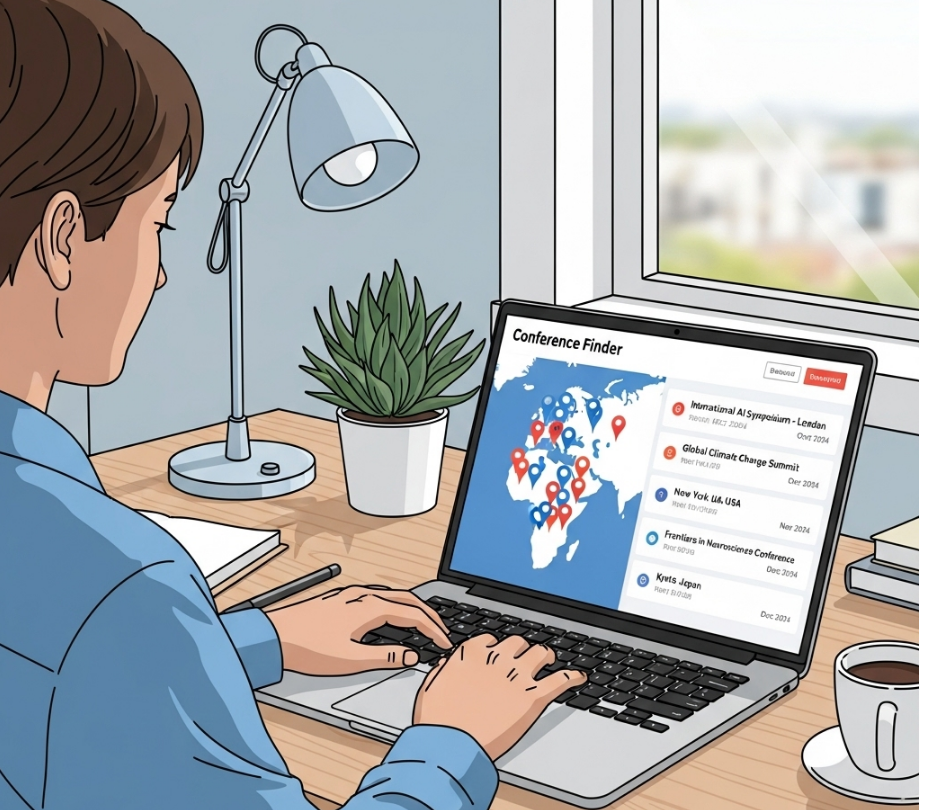

10 views||Release time: Aug 29, 2025
For any researcher, from a PhD student to a seasoned professor, finding the right academic conference is a critical task. The perfect conference can accelerate your career, provide invaluable feedback, and spark new collaborations. However, with thousands of events happening globally, the search can be overwhelming.
This guide provides a strategic, step-by-step process for using a "conference finder" approach to locate the ideal venue for your work, highlighting powerful tools that can streamline your search.

Before you start searching, you need to know what you're looking for. A powerful conference finder tool is only as good as the search terms you use. Define your non-negotiables first:
Field of Study: Be specific. Instead of "engineering," narrow it down to "robotics and automation science" or "sustainable energy engineering."
Reputation & Indexing: What level of prestige are you aiming for? Do you need the proceedings to be indexed in specific databases like EI Compendex, Scopus, or Web of Science for institutional requirements?
Timeline: What is your ideal submission deadline and when are the actual conference dates? Working backward from deadlines is crucial.
Location & Budget: Are you looking for a local event or an international one? Consider the total cost, including registration, travel, and accommodation.
Once you have your criteria, it's time to use dedicated platforms designed to aggregate conference information. This saves you from searching endless university websites and mailing lists.
One of the most efficient ways to start your search is with a centralized conference database. A prime example is iConf.org, a platform that collects and organizes academic conferences from around the world.
A dedicated conference finder like iConf.org is valuable because it typically provides:
Advanced Search Filters: You can filter events by your specific field of study, country, city, and date.
Clear Deadline Information: Submission deadlines are usually displayed prominently, which is essential for planning your research and writing schedule.
Indexing Status: Reputable finders will often specify if a conference's proceedings are indexed by major databases like Scopus and EI Compendex.
Direct Links: It provides a direct link to the official conference website, where you can find the most detailed information.
By starting with a comprehensive tool like iConf.org, you can quickly generate a shortlist of potential conferences that match your core criteria.
For a comprehensive search, it's wise to cross-reference your findings with other established resources:
WikiCFP: A widely used database, especially popular in computer science and engineering, for finding "Calls for Papers."
University-Hosted Lists: Many universities (like UPenn) maintain well-regarded, public lists of CFPs, particularly in the humanities and social sciences.
Professional Society Websites: Always check the websites of the top professional organizations in your field (e.g., IEEE, ACM, APA, MLA). They host the most prestigious conferences.
A conference finder gets you 90% of the way there, but the final step is crucial. Once you have a shortlist of 2-3 conferences, you must vet them carefully.
Visit the Official Website: This is the ultimate source of truth. Read the "Call for Papers" in detail.
Check the Organizing Committee: Are the conference chairs and committee members reputable, established academics from well-known universities?
Review Past Proceedings: Look at the papers from previous years. Is the quality high? Does your research fit in?
Beware of Predatory Conferences: Be cautious of conferences with overly broad topics, aggressive email invitations, and promises of rapid publication. A good conference finder will usually filter these out, but it's always wise to be vigilant.
By following this three-step process—Define, Search, and Vet—you can move from a general idea to a confident submission. Using a powerful conference finder like iConf.com as your starting point will save you time and help you discover the perfect opportunity to share your research with the world.